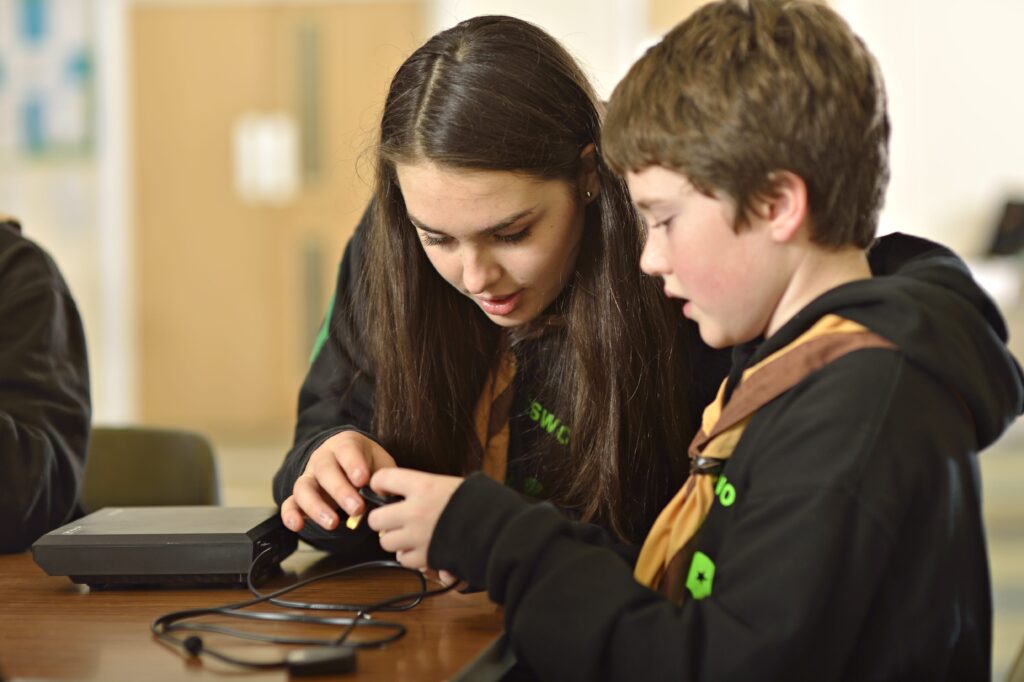The Young Leaders’ Scheme is just one of the exciting programme elements in the Explorer Scout section. The Scheme helps Explorer Scouts to develop and grow as individuals. It allows them to make a valuable contribution to their community and give service to others. The scheme also helps them fulfil the service elements of their awards and develop and grow as individuals.
Young leaders must be between the ages of 14 and 18. They are affiliated to the Explorer Scout Section and where appropriate, wear the Explorer Scout uniform shirt or blouse and the Grafton Explorer Necker.
Frequently asked questions
Can I participate if I am not in Scouting or outside of Grafton?
Grafton welcomes Young Leaders from other Districts and organisations such as Girl Guiding, Cadets or those completing the Duke of Edinburgh Scheme needing to undertake service. Under the YL Scheme you may attend regular sessions within a Scout Group providing that you complete Module A of the Young Leader Scheme in order to fulfil the requirements of the service.
How old do I have to be?
Young Leaders must be between the ages of 14 and 18 without exception. Upon turning 18 if a young leader wishes to continue volunteering they must progress through the adult appointment process.
How will Young Leader training help me outside of Scouting?
The Young Leaders’ Scheme is recognised by the Institute of Leadership and Management as a Development Programme. The ILM is one of the UK’s leading providers of leadership and management qualifications. This accreditation shows the quality of the Young Leaders’ Scheme, to any external organisations that Young Leaders might apply to in the future. This reflects the value of the skills learnt through the scheme to employers. It is one of the ways in which Young Leaders can use their Scouting training to gain externally recognised awards.
What Training do I have to do?
Young Leader training is broken up into Modules and Missions. There are a ten of modules that are designed to cover all aspects of training. They help Young Leaders become aware of, and learn how to deal with various different facets of leadership within the Scouting Movement. The modules are designed to be flexible and encourage innovation, so be as creative as you can!
To be a Young Leader, there is some mandatory training (Module A) that you must complete within the first three months that covers some of the basics you need know before taking on a leadership role. This is integral as the module provides detailed information about safeguarding and child protection. A young person is more likely to disclose to someone closer to their age. It is therefore important that the ESYL is equipped with the right skills and knowledge to deal with any situations that arise.
This training covers:
- What your role as an ESYL entails
- Understanding how local Scouting is organised
- Understanding the purpose and methods of Scouting
- Understanding how our Child Protection Policy applies to you as a Young Leader and how we keep young people safe
- Understanding our rules and how these effect your actions
There are some additional modules that allow you to take your skills further and if you complete all them, can also gain you an award – which looks great on a CV or personal statement!
Apart from Module A, Young Leaders are free to choose which modules they wish to work on and they can be completed in any order.
There are also four missions to be completed alongside the ten modules These missions are designed to allow the Young Leaders to put the learning from the Modules into practice. By doing so, you will gain in confidence and become an integral part of the leadership team within your Section and Group.
Completing the scheme entitles you to the coveted young leader belt.
What uniform do I wear?
Young Leaders should ask the Leader of the section they’re volunteering with as to what should be worn to weekly meetings.
When attending young leader training, please wear your Group necker
Who are Young Leaders?
Young Leaders are effectively Explorer Scouts who choose to devote a large proportion of their time in Scouting to service in another section and may or may not wish to be part of an Explorer Scout Unit or attend regular Explorer Scout meetings. All Young Leaders must be a member of Arrows, the Grafton Young Leaders Unit.
How are Young Leaders registered?
All young leaders must be registered with the District Explorer Scout Administrator, who can be contacted via desa@gdscouts.org.uk
How can I get the most out of our Young Leaders?
Just like adult volunteers, each Young Leader will have their own unique mix of skills, knowledge, and experiences. Check in with where they’re at, where their skills are, and what they want their time as a Young Leader to look like.
Of course, becoming a Young Leader can feel a bit daunting too. Give them the opportunity to let you know if they’ve got any worries or concerns, or if there’s an area, mission, or module they’re feeling less confident about.
Once you know your Young Leader, you can support them to get stuck in (without being thrown out of their depth). They might want to start small, and that’s OK.
When they’re ready, Young Leaders can lead games and activities and take part in planning and delivering part of the programme. Don’t forget to show them all the stuff that’s there to help, too. The programme planning tool is ideal for module H (Programme planning) and the missions – Young Leaders can filter by games or activities, and use the off-the-shelf programme to get started.
After a while, once they’ve found their feet, Young Leaders may want to take on an even bigger challenge, such as setting the theme for a whole camp or gaining a leadership permit for an activity. The key is that you’re there every step of the way, encouraging them to give it a go.
How long should a young person have left their Scout Troop for before they go back to volunteer as an ESYL?
Scouts can request to return to their old Scout Troop to volunteer as an ESYL. However, it is highly recommended that they have a break of 12 months before doing this. This extra time allows them to develop their skills, and gives the old Troop extra time to accept and adjust to the fact they are now an ESYL with different responsibilities. Having a reasonable gap will mean that the ESYL won’t just be seen as another Senior Patrol Leader when they return and are supporting their peers.
We also highly recommend considering volunteering with a different section. This helps young leaders to see how different sections and leaders do things differently. The have lots to gain from this as well of course things they can bring with them from their time in Scouting.
How to say thank you (and help Young Leaders reflect)
Young Leaders get a lot out of being volunteers, but they also give their time, skills, and energy. Don’t forget to say thank you – and make it specific, thanking Young Leaders for their contributions (whether it’s a fun game, a thoughtful activity, or a brilliant attitude).
As an adult volunteer, you’re perfectly placed to help Young Leaders reflect and recognise their successes. We all like to be encouraged, and it’s important that all volunteers recognise the stuff they’re really good at, whether they took the time to encourage a Cub to get back up and try again, or thought on their feet when a game didn’t quite work.
Take some time to think about anything that didn’t go to plan too. It’s helpful to create an environment where all volunteers (including Young Leaders) can talk about the times things go wrong. Sometimes activities are too tricky, games don’t capture everyone’s attention, or behaviour is challenging, and that’s OK. It’s a chance for people to look back at what happened, see others people’s sides, and try something different next time.
Reflecting doesn’t have to be a formal discussion – it could be a quick chat while you’re packing away equipment, or you could sit down and make it visual with pens and paper.
The Young Leader training scheme is designed to benefit adult volunteers, young people in sections, and Young Leaders; we’re really thankful to the adult volunteers who take the time to make it work. At the end of the day, everyone’s a winner: sections get the benefit of talented young people, ready to share their skills and experiences (and be a great, approachable, role model). Adult volunteers get an extra pair of hands, another perspective, and the chance to help the leaders of the future. And finally, Young Leaders get not only the fun of getting involved, but the skills they need for college, university, the job interview, the important speech, the tricky challenge, and the big dreams (in a nutshell, the skills they need for life).
Keeping Young Leaders and young people safe
Young Leaders have a position of responsibility, but they’re still aged under 18, so adult volunteers need to follow the ‘Yellow Card Young People First’ code of practice (download it here or order it from Scout Store) and Safety and Child Protection Policies. Young Leaders count as young people (not adults) for ratios, and if you’re staying anywhere overnight they need separate accommodation from both the young people in the section and the adult volunteers. The Orange Card is the ‘Young People First’ code of practice for Young Leaders (download it here or order it from Scout Store) – make sure all Young Leaders have a copy, and that they understand it too.
What are the sleeping arrangements on camps and residential trips?
When the ESYL takes part in a camp or residential, consideration should also be given to the sleeping arrangements. The ESYL should have their own separate accommodation. They should not share with adult leaders, or with the young people in the section.

I want to register to be a Young Leader
You do not need to be a current member of the Scout Association to become a young leader. If you are interested in developing leadership skills and volunteering please get in touch.
Young Leader Training
The Young Leaders’ Scheme is the training programme for Explorer Scout Young Leaders. It contains 11 modules and four missions for ESYLs to work through whilst volunteering in their chosen section. All ESYLs and Duke of Edinburgh volunteers are required to complete at least Module A within 3 months of commencing their role.
Modules give ESYLs the skills and knowledge to be successful in their role, while missions allow them to put everything into practice with support. As well as developing valuable life skills, the Scheme is an opportunity for ESYLs to make a positive impact in their communities and to fulfil the service elements of many of the top awards in Scouting. Recognition of achievement is available along the way, and on completion of the Scheme, the ESYL is awarded with an ESYL belt buckle.
Training in Grafton
In Grafton, all modules are run across the year.
All training events and Young Leader Unit Meetings are emailed out to registered young leaders. If you have any queries, please contact Matt, our District Explorer Scout Administrator / Young Leader Admin, on desa@gdscouts.org.uk.
Young Leader Training Support Team

Dave Deane
Explorer Scout Leader (Young Leaders)

Harry Huckin
Explorer Scout Leader (Young Leaders)

Niki Braker
District Explorer Scout Administrator / Young Leader Admin










